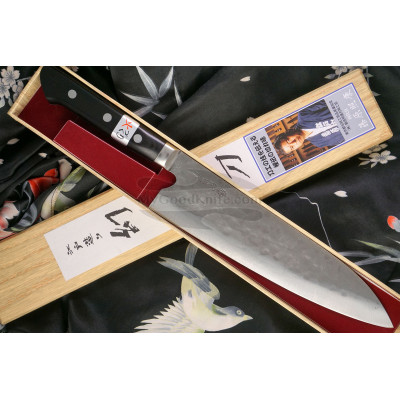Gyuto Couteau Japonais Teruyasu Fujiwara TF2308 21cm
-
Expédition rapideNous expédions dans le monde entier ! Si la commande est passée un jour ouvrable avant 12h00 (heure finlandaise), nous ferons de notre mieux pour l'expédier le jour même.
-
Paiement facileMyGoodKnife propose plusieurs options de paiement pour votre achat : carte de crédit ou paiement direct sur compte bancaire.
-
Achats sécurisésMyGoodKnife est sécurisé avec un certificat SSL (Secure Socket Layer). Notre boutique en ligne est cryptée avec une protection SSL 128 bits. Lorsque vous accédez aux pages de paiement, votre transaction de paiement est entièrement sécurisée !
-
Assistance clientsContactez notre service client via chat en direct, e-mail ou formulaire de contact. Nous faisons de notre mieux pour répondre à toutes les demandes dans les meilleurs délais.
-
Remboursement de retourLes clients de l'UE ont le droit d'annuler leur commande dans les 14 jours ouvrables suivant la livraison et de retourner les marchandises pour un remboursement complet (à l'exception des frais d'expédition). Les marchandises doivent être retournées dans un état vendable (inutilisé), emballage compris.
Japanese chef knife gyuto with 210 mm blade. Handmade by mr. Teruyasu Fujiwara. The Gyuto is the Japanese version of the classic Western Chef's knife. The difference is that the gyuto's blade is thinner and holds a sharper edge. Blade is made of Shirogami 1 stell with stainless steel clad. Handle: pakka wood. Hand wash with warm water and towel dry.
- Référence
- TF2308
- Marque
- Teruyasu Fujiwara
- Pays
- Japan
- Acier
- Shirogami #1
- Poignée
- Pakkawood
- Longueur des cordes, mm
- 210
- Dureté
- 60-62 HRC
- Total length, mm
- 340
- Blade thickness, mm
- 2.9
Il y a plus de 130 ans, Teruyasu Fujiwara le premier a commencé sa carrière en tant que maître forgeron en forgeant des outils agricoles. Lorsque son fils, Fujiwara le deuxième, a atteint l'âge approprié, il a été placé en apprentissage chez le célèbre forgeron d'épées de Tokyo, Masahide Suishinshi. Après quelques années de formation, il est retourné à l'atelier de son père et a entamé une carrière réussie en tant que maître forgeron d'épées. La famille a continué cette tradition jusqu'à ce que la fabrication d'épées soit restreinte après la Seconde Guerre mondiale. À la fin des années 1960, la famille Fujiwara a commencé à fabriquer des couteaux de cuisine. Ils étaient déterminés à fabriquer des couteaux qui rendraient fier une famille de forgerons d'épées. Dans cette optique, ils ont passé les dix années suivantes à développer l'acier et les techniques nécessaires pour souder l'acier inoxydable avec de l'acier au carbone et à tempérer correctement la lame. Il a fallu toute la connaissance accumulée par la famille au cours de plus de 100 ans de forgeage d'épées pour produire avec succès leur gamme actuelle de couteaux de cuisine. Depuis la fin des années 1990, Fujiwara le quatrième a continué la tradition familiale.




